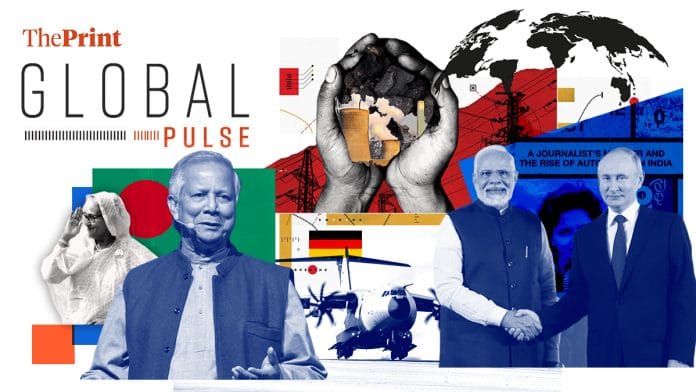New Delhi: Giving his analysis of the change in India’s attitude towards China, geopolitical expert S.L. Kanthan in an opinion piece for Global Times writes that “India had been lured by the grand promises of the Americans,” but has begun to “realise that being an ‘ally’ of the US means being a vassal”.
In the opinion piece, titled ‘Can economic pragmatism prevail over political expediency for India to drive a reset in ties with China?’, Kanthan cites US opposition to Prime Minister Narendra Modi’s visit to Russia as an example of Washington’s “imperious attitude”.
As for India-China ties, he lists three reasons for what he refers to as a change: “geopolitical realities such as the rise of a multipolar world, the imperious attitude of the US, and China’s inimitable prowess in technology and manufacturing”.
Kanthan goes further to discuss relations between India and China in light of an agreement between two sides to address border issues, as well as reports that India was considering easing restrictions on Chinese investment.
He also highlights the shift towards a multipolar world and the declining influence of the US. “The final blow to imperialism came when the combined efforts of the US, EU, and NATO failed to crush the Russian economy, isolate the Russian president, or defeat the Russian military over the last two years and a half,” he writes.
Adding, “China is about 25 percent larger than the US, BRICS is bigger than G7, and developing nations have surpassed developed economies.”
Covering the India-Germany joint drills for Deutsche Welle (DW), Dharvi Vaid notes that the Tarang Shakti exercise will see the participation of 10 countries — including Germany — with their air assets. A total of 18 nations are slated to take part in the drills as observers.
The first phase of the drills, from 6 to 14 August, will feature Germany, France, Spain, and the United Kingdom war-gaming alongside the Indian Air Force (IAF).
These drills come as India and Germany seek to “shore up their defence relations,” writes Vaid in the report titled ‘Air drills bring new thrust to India, Germany defence ties’.
Besides noting the participation of Eurofighter Typhoon jets and an Airbus A400M transport aircraft, the report suggests that through the drills, India aims to “demonstrate its strength in the Indo-Pacific region” and mark a shift from its “Russian-dependent fleet”, whereas Germany is looking to ramp up “its Indo-Pacific strategy in the face of China’s rising clout and muscle-flexing in the region,” and the war in Ukraine.
Journalist Nitish Pahwa reviews Rollo Romig’s book I Am on the Hit List, for the The New York Times. The book, he writes, is a “story of one of India’s most vigorous protesters: Gauri Lankesh”. Lankesh, a veteran journalist and editor of Kannada daily Lankesh Patrike, was shot dead outside her home in Bengaluru in September 2017.
Noting that the general election this year saw the Bharatiya Janata Party (BJP) seat share fall as the opposition parties gained lost ground, the review said, Prime Minister Narendra Modi and the BJP “no longer appear as dominant as they once did”.
This, wrote Pahwa, was despite Modi’s politicisation of democratic institutions and attacks on opponents, protests by students, farmers, and athletes which he opined helped preserve democracy.
The review, titled ‘A Reporter Who Risked and Lost Her Life in Modi’s India’ focuses on Romig’s book, which, Pahwa says, delves into Lankesh’s life, the Hindu nationalist threats she faced, and the broader struggle against ethnic majoritarianism in India.
A report for ABC News by Sibi Arasu of the Associated Press details India’s continued reliance on coal for electricity generation despite efforts to boost renewable energy capacity. India’s demand for coal rose nearly 10 percent in 2023 and 70 percent of its electricity needs are still met by coal, says the report, titled, ‘India has pushed hard for solar. But as its billions demand more power, coal always gets the call’.
Adding, “India has been significantly increasing its renewable energy capacity in recent years, but when demand for electricity surges, it still goes back to its most trusted source of power.”
Arasu quotes experts who suggest that India needs to install 50-60 gigawatts of clean power annually to meet demand. However, only 15 gigawatts of wind and solar have been added each year due to policy and supply chain issues, it notes.
To enhance energy storage, the government announced a $452 million plan, with battery storage costs decreasing globally. India has also called for more support from developed nations in terms of funding and technology, the report adds.
Writing for Bloomberg, Matt Day reports that Amazon’s India country chief Manish Tiwary is set to step down in October.
While a successor has not been announced, Amit Agarwal “who led Amazon’s initial push into India” will be working closely with the Amazon team, writes Day in the report titled ‘Amazon’s India Country Chief Is Stepping Down in October’.
Citing the importance of the Indian and Asian market for Amazon, he notes, “Amazon’s investment in India, which the company said last year would reach $26 billion by 2030, is among its biggest efforts to find new sources of growth outside North America.”
Harris picks running mate, Yunus to lead interim govt in Bangladesh
US Vice President and Democratic presidential candidate Kamala Harris held her first rally with Minnesota Governor Tim Walz, a day after she named him as her running mate for the November elections. To know more about the rally in Philadelphia, read the BBC’s report.
In Bangladesh, Nobel laureate Muhammad Yunus will lead the interim government after months-long student protests led to the resignation of prime minister Sheikh Hasina after a decade-and-a-half in power. To know more, read Al Jazeera’s report.
(Edited by Sanya Mathur)
Also read: Why Bangladesh turmoil could be a problem for India & top women wrestlers ‘fight back’ at Olympics






